Yulia Gaydukevich and her wife fled Moscow a year-and-a-half ago with their teenage child.
As a gay couple with a son about to turn 18, they were particularly vulnerable and feared being targeted by the Kremlin because of their sexuality, which does not conform to what the Russian state sees as the country's "traditional values".
They were also worried that their son would eventually be conscripted into the Russian army and sent to fight on the frontlines in Ukraine.
"Me and my wife could never speak openly about our family, about our relationship," she told RTÉ News.
Ms Gaydukevich said other lesbian couples must sneak around and constantly keep themselves in check in public to make sure members of the public are not suspicious.
She said: "My friends back home have a huge problem right now.
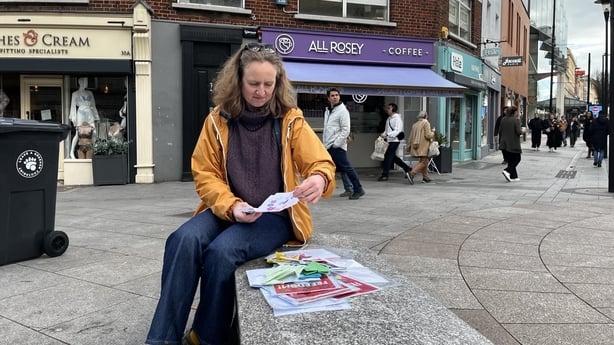
"They had to delete all their social media accounts and it's very sad because a lot of people are against the war but there are also a lot in favour [of it] and they are against us and support the government."
In the early days of the Russian invasion, Ms Gaydukevich felt brave enough to attend some small protests in Moscow, but the hostile reaction of the police scared her so much that she knew she had to leave her homeland, which she said she misses very much.
"I was afraid, really afraid," she recalled, adding "I couldn’t spend my life in prison, but I feel so much appreciation and respect for the people who stay".
"I am abroad and I am free, they are not"
Reports have suggested that up to one million Russians have left the country since the start of the war in Ukraine.
Now safe in Dublin, Ms Gaydukevich turned her attention to helping those who could not get out in time.
Her family volunteered for the 'Letters Across Borders' project, which sends messages of support to the estimated 2,000 political prisoners incarcerated in Russia.
"The writing [of] letters, this is the last act which we can do freely more or less you know," she said.
She said: "However, there is still a risk. People [Russians abroad] are still afraid, scared. We couldn’t speak about meetings or any protests, such as the huge one [2012]."
"I’m not a hero, that’s why I’m here in Ireland,’’ she said," adding, "I am abroad and I am free, they are not".
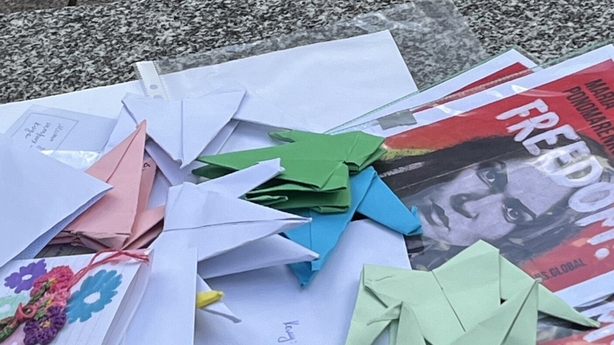
Ms Gaydukevich described the support volunteers have received from the Irish public as "amazing".
The organisation has received letters from all generations to send to the prisoners.
"This is how the letters can help make society more humane and [better] understand their situation," she said.
"We are trying to make a bridge [between the West] and those who have been imprisoned," she added.
Daniel Klyuka: Sentenced to 20 years
Just before the war in Ukraine broke out, one of the first things 28-year-old Daniil Klyuka did was send money from Russia to his family in Ukraine.
"There was no possibility to send any bank transactions at the time. So, he sent us crypto currency," recalled his first cousin 25-year-old Mykyta Laptiev - who re-located to Ireland following the Russian invasion.
Mr Klyuka’s act of kindness would prove to be a fatal error of judgement, an act that would not go unpunished by the Russian authorities and cost him his freedom.
Mr Laptiev said: "At the start of the war Daniil was really concerned. He's a pacifist at heart.
"He said the war won't escalate and we don't need to do any aggression here [in Russia], we only have to talk to Ukraine."
At the start of the war, Mr Klyuka worked as an art teacher at a primary school in the city of Lipetsk, situated southeast of Moscow.
His family said it was a job he loved because it combined his twin passions of teaching and creativity.
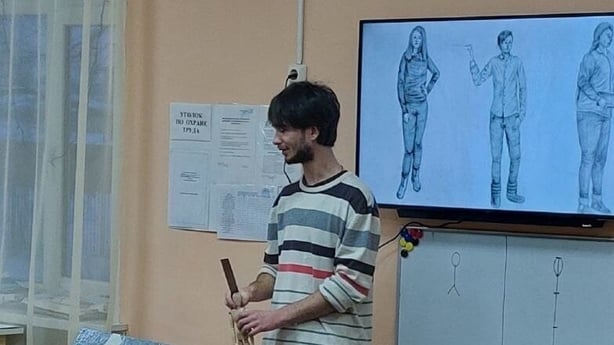
Russian teachers are required to subscribe to their local newspapers, which are heavily controlled by the state and take a pro-government stance.
"It’s basically just propaganda about like how the government is doing a good thing, like how the war in Ukraine is justified," Mr Laptiev said.
The trouble began when Mr Klyuka began to doodle on the newspapers in the workplace, partly as a way of expressing his emotions and concerns about his family in Ukraine.
"In Russia, you just can't talk about it [the war] without being prosecuted," Mr Laptiev said.
Mr Laptiev said his cousin was drawing "silly, childish" things on the newspaper.
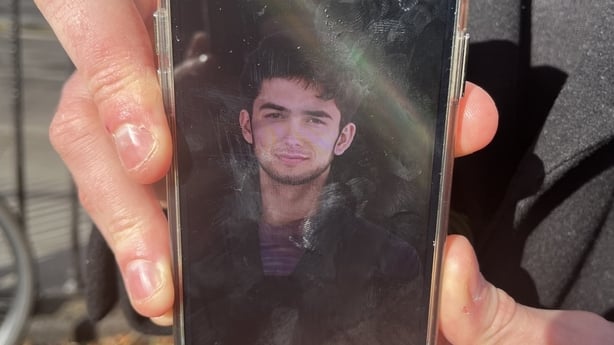
"He drew a dodgy moustache on an official who appeared in a photo in the paper, he put horns on another person. He was emotional about the situation," he added.
One day Mr Klyuka forgot to take his newspaper home. When a colleague found it, he reported Mr Klyuka to the school management.
He was accused of expressing anti-war sentiment and of "Nazism" and was immediately dismissed from his post. The school handed the drawings over to the FSB, alleging that he was interested in explosives due to the content of the drawings.
"The FSB then invaded his [Daniil's] grandfather's house where he was staying," Mr Laptiev said, adding "they took lots of his personal belongings and didn't provide any information".
The Memorial Organisation is an independent human rights project that collects information about illegal criminal prosecutions for political reasons and provides assistance to victims of prosecutions, such as Mr Klyuka, who has been designated as a political prisoner.
According to his testimony published on the platform, Mr Klyuka explained what happened when he was summoned to meet the principal.
He told investigators: "I went to my former job and only managed to walk a hundred metres, when the masked show began - face down in the snow, a bag over my head, then a basement in an unknown place.
"I won't tell you what happened there. I'll leave out the details."
The UN estimates that there are at least 2,000 Russian political prisoners incarcerated all over Russia.
Campaigners and Russian citizens abroad estimate the actual figure could be as high as 5,000.
UN Special Rapporteur Mariana Katzarova, an independent observer with responsibility for the human rights situation in Russia, said that the oppression has only intensified since the Ukraine war began in 2022.
The Russian government has banned citizens from criticising the war.
According to Amnesty International, under the censorship laws, the smallest of actions can be met with a maximum sentence of 15 years in prison.
Even calling the war "a war" instead of a "special military operation" is considered a crime.
In 2023, the length of prison sentences for anti-war posts on social media increased. In 2024, a new law was introduced to allow confiscation of the property of people who were charged under the war censorship laws.
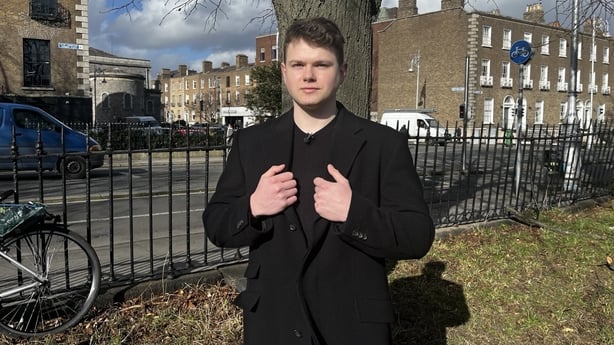
Among those imprisoned is a priest who received a seven-year sentence for saying a prayer against the war.
Another citizen, Vladimir Rumyantsev, built a portable radio station to transmit uncensored news about Russia's invasion of Ukraine. Russian authorities tracked the source of the signal, and he was sentenced to three years in prison.
Aleksandra Skochilenko replaced price tags in a local supermarket with small anti-war labels. After a global outcry when she received a seven-year sentence for her actions, she was released from prison as part of a prisoner swap last year having served nine months.
Others, including Daniil Klyuka, have not been so lucky.
According to his family and the Memorial Organisation, the FSB discovered two cryptocurrency transfers totaling 120,000 roubles, which Mr Klyuka was accused of sending to Return Alive - a Ukrainian fund established to support the Ukrainian military.
Mr Klyuka was remanded in custody on charges of financing terrorism - Article 205.1, Part 1.1, of the Russian Criminal Code - and treason for providing financial assistance to a foreign state - Article 275.
"Imagine you're doodling, just silly cartoons and you are accused of lies and it ends your whole life. It's just wrong"
"They [FSB] said that he is sponsoring terrorism because of the cryptocurrency exchanges, but it's impossible to tell where you're sending money," Mr Laptiev recalled.
"But Daniil sent the money to me, it was a humanitarian gesture to help our family. He didn't want us to suffer," he added.
Mr Laptiev said: "They [FSB] tortured him to say that he [Daniil] sent the funds to terrorists, and he did not do nothing wrong.
"Imagine you're doodling, just silly cartoons and you are accused of lies and it ends your whole life. It’s just wrong."
During the investigative and court proceedings, Mr Klyuka admitted his guilt.
In a letter later sent from prison, however, he told his family he had been held in a basement and coerced into confessing.
It is a story that is all too familiar to organisations chronicling the human rights violations occurring in Russia.
We need your consent to load this rte-player contentWe use rte-player to manage extra content that can set cookies on your device and collect data about your activity. Please review their details and accept them to load the content.Manage Preferences
Ms Katzarova said the situation is so dire that 12 children have been jailed on charges of "terrorism" and "extremism".
According to Amnesty International, Russian schools are a platform for indoctrination and suppression of dissent, with the organisation claiming that families are forcibly separated as a means of repression of both adults and children.
"Thousands of Ukrainians have been deported to Russia, subjected to enforced disappearance and experienced systematic torture, including rape and sexual violence," Ms Katzarova recently said on the first anniversary of the death of Alexei Navalny.
Campaigners have claimed that eight people died in Russian prisons in 2024.
At least 120 are believed to be in imminent danger and authorities have been asked to release them immediately on health grounds.
Russian officials said the West routinely exaggerates the extent of repression in Russia.
RTÉ News contacted the Russian Embassy in Dublin for comment on the claims mentioned in this story, but did not receive a reply.
On 19 June 2024, a military court sentenced Daniil Klyuka to 20 years in prison.
He is serving the first five years in Vladimir Central, the largest prison in Russia.
"It's not right and the worst thing is there is not a lot I can do to help him being so far away from home,"
Mr Klyuka will spend the remaining 15 years in a maximum security, strict penal colony, similar to the facility where Mr Navalny was sent in the Arctic.
The last time Mr Laptiev heard from Mr Klyuka was more than a month ago.
Mr Laptiev said: "He's regularly sent to the 'SHIZO' [solitary confinement cell].
"There is no natural light, no bed. Nothing. There is just a mattress and a bucket which you use like a toilet.
"So, you're in a small cell where it's very cold, no access to proper food, no access to health [facilities], and no access to a normal bed.
"Often 15 days of complete isolation. Nobody speaking to you, just sitting there."
Mr Klyuka's family say they feel powerless to help.
"It's not something we can comprehend completely. It's not right and the worst thing is there is not a lot I can do to help him being so far away from home," Mr Laptiev said.






